#breadlines
Text

White Angel Breadline. San Francisco, California. 1933
Photo: Dorothea Lange
54 notes
·
View notes
Text
being online can be so humbling sometimes cos there's a whole generation of internet users who barely know who david cameron is. all I've seen is "do we like this one orrr??" first of all please do your own research and don't rely on the opinions of others, second of all NO WE FUCKING DO NOT
#i was only 9 when he was elected in but i grew up in under the breadline poverty so i never had the luxury ignoring politics#i knew exactly who was responsible for fucking me over at every turn#and the worst thing is because everyone that came after him was actual kicking puppies villain level we've got people going#'aw well he's not that bad. the best out of a bad lot' omg he is still AWFUL like fuck!!! i am losing my mind!!!#beth.txt#uk politics
63 notes
·
View notes
Text
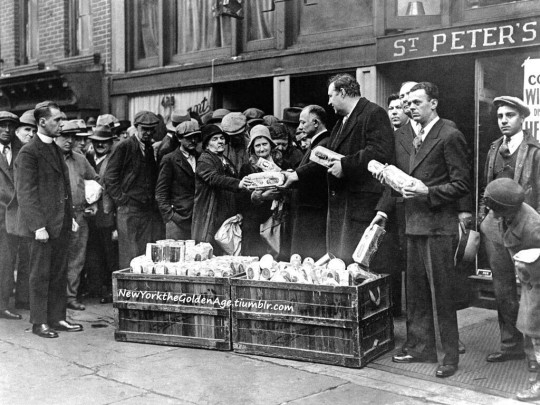
The Reverend Raymond Brown and others hand out bread and milk to unemployed people outside St. Peter's Mission, around January 23, 1931.
Photo: Associated Press
#vintage New York#1930s#Great Depression#hunger#food bank#breadline#23 Jan.#food pantry#Jan. 23#charity
44 notes
·
View notes
Text
A few more photos of actual grocery stores in the Soviet Union during Socialism:
As one can quickly see, there were neither breadlines, nor mass rationing in normal times.

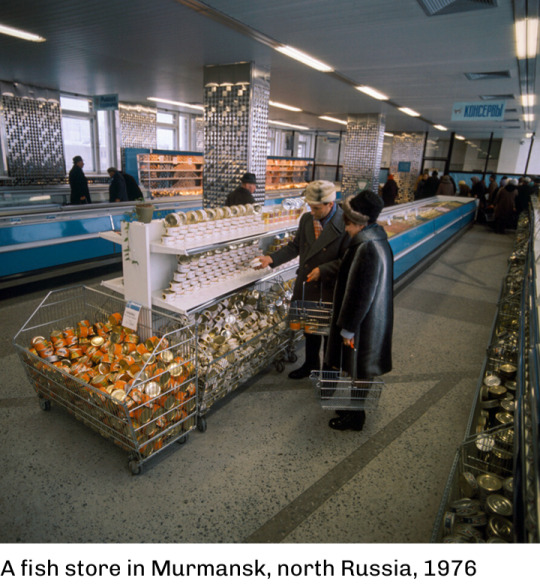
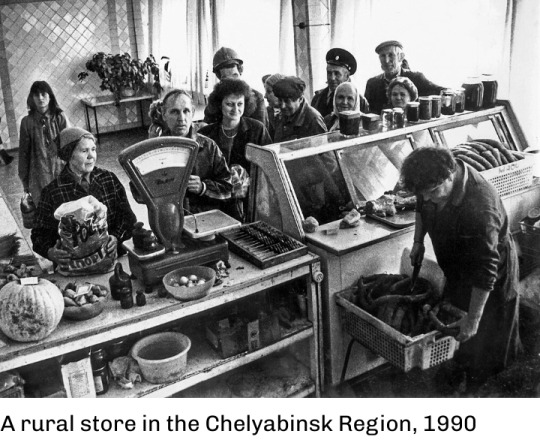
However, once Capitalism began to be re-introduced in 1985, the Soviet system quickly unraveled, leading to the breadlines famous in photos like this one from 1988:
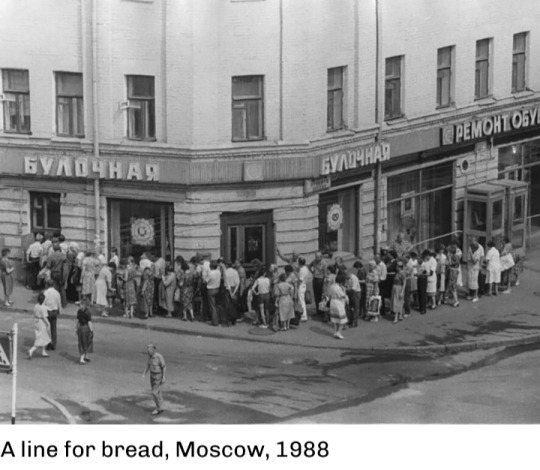
#ussr#ussr history#grocery shopping in the ussr#soviet breadlines#socialism#socialist politics#marxism leninism#communism#communist#socialist#marxist leninist#marxism#progressive politics#soviet union#soviet history
212 notes
·
View notes
Text










I steal only what I can’t afford. That’s everything!
#aladdin#disney#disneyedit#disneynetwork#bigfrozensix#disneyfeverdaily#fyeahdisney#disneygifsdaily#disneydaily#aladdinedit#animationedit#movieedit#gotta keep one jump ahead of the breadline
485 notes
·
View notes
Text
“With more household technology available, women could have found themselves with more time to spend outside the house. Moreover, the birth rate had declined. In 1800, white women had given birth to an average of 7 children each; in 1900, the average was 3.56; and in 1929, it was only 2.4. Women of all groups were having fewer children. Birth control was still controversial, and it was even illegal in many states, but middle-class women were able to get birth control devices from their private physicians, and in large cities some clinics opened to serve working-class women.
However, this still left many working-class women without birth control. And even when they could get birth control information, in an era before the Pill had been invented and when diaphragms and even condoms were not always readily available, they often found their husbands uncooperative. Yet, even though they continued to have more children than middle-class women, birth rates among the working class also declined. No sooner were there fewer children in the home, however, that experts began to agree that mothers should pay more attention to each one.
As advertisements for a laundromat in Muncie asked, “Isn’t Bobby more important than his clothes?” And one ad selling electricity declared of the “successful mother” that “she puts first things first. She does not give to sweeping the time that belongs to her children… The wise woman delegates to electricity all that electricity can do.” Women who were involved in charitable work, social and political service, and even wage work--despite the fact that most working mothers took paying jobs only out of dire need--were attacked as selfish, as taking jobs away from men who needed them to support families, and as undermining the stability of the home. It was argued that having a woman in the home would keep a child off the streets.
…In an economy built around gratification rather than thrift, women’s activism outside the home was taken as a sign of an unfulfilled life. Women did not cease, of course, to rely on other women for support and intimacy. As with politics, however, the range of tolerated behavior shrank, and what had been acceptable before the war now was questionable. Some young women even feared to share apartments with each other lest they be suspected of homosexuality. And, in the same way that new fears of radicalism split women’s political organizations in the 1920s, new fears of homosexuality made it harder for women to form women’s groups whose purpose was women’s equality and independence.
Women’s focus was not supposed to be other women. According to the advertisers and the new psychologists, their emphasis was supposed to be on how to attract men. Women could find fulfillment, the argument went, only through marriage. In the 19th century, marriage was supposed to involve self-denial and self-sacrifice by women. Now, particularly for the highly educated middle class, it was supposed to prove sexual satisfaction and self realization. Marriage was supposed to be the gateway to a fuller life, not just for women with low-paying monotonous jobs but also for college-educated women. Sexual fulfillment in marriage, not a career, was depicted as the ultimate fulfillment for women.
…Despite the increasing availability of birth control, a new focus on sexuality, and a redefined concept of housework, marriage had a hard time living up to its reputation. Not all women found marriage a way to a fuller life. Tensions rose around consumption. Raising children became more and more expensive, and working-class women continued to have less access to money and birth control. Fears of conceiving another child they could ill afford affected these women’s sexual pleasure. And expectations of a way of life that did not materialize led to disappointment.
In a 1920s study of Muncie, Indiana, when working-class women were asked what gave them the courage to go on life when they had become thoroughly discouraged, not one of the women mentioned her husband. In difficult times, husbands became not so much individuals as the focus of their wives’ problems and fears about jobs and conception. The divorce rate rose steeply. From 1870 to 1920, the number of divorces in the United States increased by a factor of 15. In 1924, one marriage in seven ended in divorce. More wives than ever before had done paid work during marriage. They knew they had options other than staying in an unsatisfactory marriage. Life was not easy for divorced women, but no longer was divorce the disgrace it had been in the previous century.”
- Sarah Jane Deutsch, “Fun, Fads, and Family.” in From Ballots to Breadlines: American Women, 1920-1940
#sarah jane deutsch#1920s#american#20th century#history#gender#marriage#sexuality#from ballots to breadlines
13 notes
·
View notes
Photo



Breadlined
A war paint that bakes your gun into a nice, scored loaf. Probably not edible!
Type: Warpaint
Class: All
Accepted in game: No
This toasted warpaint was made by steam user Diva Dan. Posted on March 9th 2021, you can vote for it right here!
41 notes
·
View notes
Text

was in a super long ponytown bread line (im the bright blue hair & shades guy )

red circle version just in case u cant see it
this is how long it was in its peak
2 notes
·
View notes
Text
if youre on pony town join the bread line outside of the bakery!! we're going for a world record!!
12 notes
·
View notes
Text
Single women headed households as independent widows, deserted wives, single mothers and spinsters, earning their own livings, often on the breadline in rural communities, but sometimes very successful in towns: especially in luxury goods and retail business, lending small amounts of money to familiar faces – trusted creditors.
"Normal Women: 900 Years of Making History" - Philippa Gregory
#book quote#normal women#philippa gregory#nonfiction#single women#head of the household#independent#widow#deserted#wife#single mother#spinster#breadline#rural communities#towns#luxury goods#retail#moneylending#creditors#trusted
2 notes
·
View notes
Text
causing absolute bread chaos in Pony Town.
(Im the Amnesia Fluttershy towards the left next to Rainbow Dash)
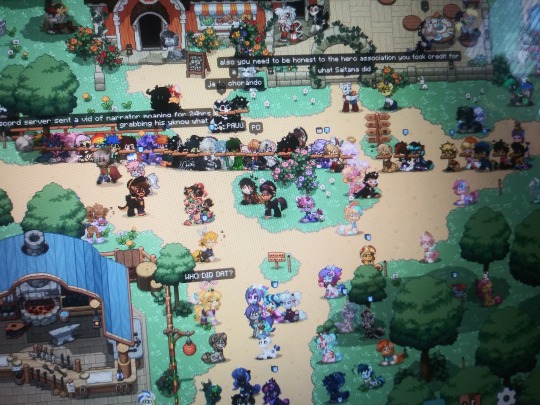
8 notes
·
View notes
Text
like idk i have to remind myself that while everyone is a unique person containing multitudes that a lot of those multitudes are fucking DUMB and i have definitely put myself in a bubble of radicals and prison abolitionists and the avg american still thinks what type of sex u have will radically alter ur entire body shape
#like having to remind myself that there are lots of ppl who in fact do still think communism is breadlines and like Russia NOW#like i had a friend who would judge men for having too small of dicks bcuz she 'knew' there were exercises to lengthen it#we not friends no more but like she believed this at like 26 bro#we are all gonna die
10 notes
·
View notes
Text

As a Jew I find the idea of a Jewish riot hilarious, but apparently it happened in April, 1930. Just five months after the 1929 stock market crash that signaled the start of the Great Depression, thousands lined up to get matzoh for Passover (a Pesach breadline). Up to 5,000 people stood in the cold outside a Lower East Side synagogue, then, frozen and furious, tried to break into the basement. Four local beat cops had to call for backup to help quell the uprising. This went down in history as the Matzoh Riot.
Photo: Jewish Daily Forward via Urban Archive
#vintage New York#1930s#riot#Passover#Jewish riot#Matzoh Riot#Great Depression#breadline#Lower East Side#old NY#New York City#Pesach
154 notes
·
View notes
Text
If yall have pony town go join the breadline started by my bro @mungoborne its growing
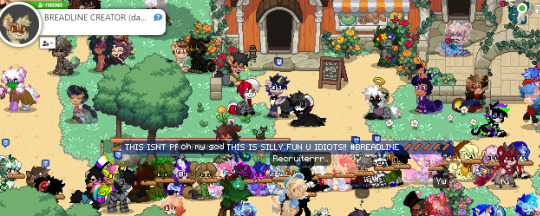
5 notes
·
View notes
Text
‘I need to know how to navigate this,’ Sicily says without preamble. ‘That wretched man has a bee in his bonnet about me. Thinks I have something to do with George’s death and I was trying to put it on you.’
‘Did you? And were you?’ Downey asks.
‘No and no. It was there when I found George, just as I said. The thing is, I don’t have an alibi for the time in which it happened.’
‘Right.’
‘And I know how the evidence looks. I am not so stupid as to believe that if I have nothing to hide I have nothing to fear from the police. I wasn’t born yesterday.’
‘I was never going to suggest such a thing. The Watch are horrid and I wouldn’t trust any of them an inch.’
Sicily tilts her head in slight acknowledgement of the one thing they apparently agree upon. She pours herself more tea, adds milk afterwards. She should add it first, Downey thinks, if she truly wants to be a proper lady as she is so clearly attempting to do.
Downey and Sicily said ACAB but only because they’re both terrible and don’t want to deal with the repercussions of their actions. They like to fuck around and aren’t interested in finding out.
Vetinari: do stupid things, suffer stupid consequences.
Downey: sounds like something that happens to other people. I have money, didn’t you hear? I shouldn’t have to face the consequences of anything I, or people around me, do.
Vetinari:
Vetinari: get out of my office.
#Downey does finger guns and walks out backwards#lord downey#discworld: the place where nothing actually changes really#it's only because vetinari is in charge#that things are marginally better than they were under snapcase#80% of that population is still on the breadline I bet#and once Vetinari carks it - who knows#that's the issue with dictatorships - you might get a good one who is alright but there's nothing in place to ensure it remains thus#all of Vetinari's weird little things that show some chercks and balances are aesthetic only#and only because he is willing to play the game too - if tomorrow he decides he isn't going to play the game. well. tough luck.#he's the man with the vote.#also he's still disappearing people and having people assassinated he doesn't like or who cause him trouble - like Gilt#pretty sure whoever inhumed that asshole didn't leave a reciept which makes it murder#anyway#none of this matters#thus always#thus always the redux#writing
4 notes
·
View notes
Text
FDR sure did pave the way for certain federal benefits and programs, it’s too bad that he also wanted to scale them back near the end of his bit because he was hoping for the relief programs to be temporary for the dire economical situation and also wanted relief programs to be more the responsibilities of the states in the end. He thought that the economy was turning around because unemployment went from like 22% to 16% or something like that and thought it meant he could defund the federal relief programs when maybe it was more a sign that the federal relief programs were working.
A Square Meal honestly seems like a really good look at relief programs and social work overall. It talks a lot about public opinion and political opinion and the life situation people found themselves in and how people responded to the jobless throughout the Great Depression. The initial pity, the millionaires’ grand gesture of charity, President Hoover’s policy of leaving the relief effort up to the power of individuals. The shame that people who lined up in the breadlines felt, the fear and suspicion of people about whether these poor and hungry were “freeloading,” the poor entering the system and not being set up for success, therefore staying in the system, that being used as proof that they were freeloading. Federal policy trying to shift from relief in the form of money and food to relief in the form of educating about nutrition and having a bit of working requirement to get money or food in return, eventually going to providing federal jobs, but still paying less money than you’d get for an “actual” job I guess, only there weren’t enough federal jobs and the jobs were seasonal so a significant chunk of the year was spent waiting and budgeting for the next job.
There’s so much about the question of how do you help a population get out of poverty? There was some amount of recognition that starving people don’t really have the energy to find a job. A lot of federal social workers did as much advocating as they could, trying to balance their needs with avoiding a situation of learned helplessness. And at the same time, the country just having so little pity for those people who did need help, believing that people in that situation just were unwilling to get themselves out, spitting so much shame at them. Some states apparently made it a requirement to have your names published in the papers in order to apply for relief. Like. Jesus Christ. Is that still going on? Hope not.
Anyways, apparently there used to be like federal camps and concentration camps (this was before “concentration camps” took on a reeeeal bad meaning in WWII lol) where they housed young men and put them to a sort of “military” regimen to try to get them able to leave and work. Which apparently was popular with states because it actually “cleaned up their streets” since all the homeless then went to those places sort of out of the way. But then of course they complained about these people getting “free rides” and the federal government defunded them until they couldn’t be as effective as maybe they could be and then all the homeless migrated back; so many migrant workers during the dust bowl trying to move to other states where they heard there were jobs but being met at the border by the police who jailed them and tried to kick them out or ship them to the next county or something to make it their problem. (USA still 50 countries in a trench coat lol) It just continues to be this cyclic story of providing relief, but not enough because nobody wants it funded that much, then getting angry at people for getting relief and defunding it and people suffering. It’s just a bit depressing to see.
#malky reads#a square meal#there’s just so much in all this man.#people in the Great Depression only outraged and scandalized about poverty#when they started seeing the breadlines getting so long#and also saw men in ~collared shirts~ waiting in line too#psychology of the public and psychology of the poor#maybe I should read some good news instead for a bit#or about Wilson mizner#and his nome escapades
2 notes
·
View notes